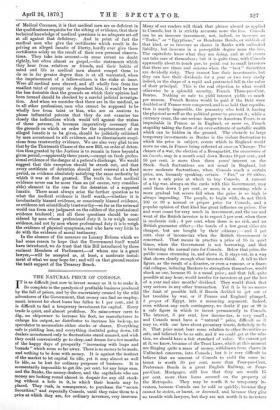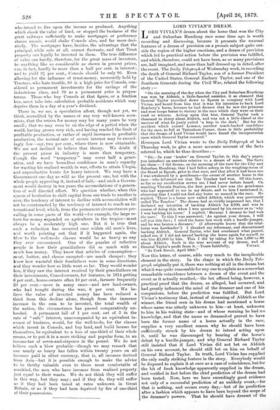THE NATURAL PRICE OF CONSOLS.
IT is as difficult just now to invest money as it is to make it. So complete is the paralysis of profitable business produced by the fall of prices, and by the uncertainty created by the wild adventures of the Government, that money can find no employ. ment, interest for short loans has fallen to 1 per cent., and it is difficult to find a temporary investment for capital. Every trade is quiet, and almost profitless. No mine-owner cares to dig, no shipowner to increase his fleet, no manufacturer to enlarge his output, no distributor to increase his lock-up, no speculator to accumulate either stocks or shares. Everything safe is yielding less, and everything doubtful going down, till dealers accustomed only to fluctuations stand amazed, and wish they could conveniently go to sleep, and dream for a few months of the happy days of prosperity " increasing with leaps and bounds " which seem so far away. There is no money to be made, and nothing to be done with money. It is against the instinct of the market to let capital lie idle, yet it may almost as well lie idle, as be lent for ordinary purposes of business. It is momentarily impossible to get 30s. per cent. for any large sum, and the Banks, the money-dealers, and the capitalists who use money are looking round almost in despair for any old stock- ing without a hole in it, in which their hoards may be placed. They rush, in consequence, to purchase the " secure Securities," and especially Consols, until they raise them to a price at which they are, for ordinary investors, very insecure. Many of our readers will think that phrase absurd as applied to Consols, but it is strictly accurate none the less. Consols can be an insecure investment, not, indeed, so insecure as " Turks," or " Egyptians," or Honduras Bonds, or rubbish of that kind, or so insecure as shares in Banks with unlimited liability, but insecure in a perceptible degree none the less. The capitalists know what they are doing, and at all events can take care of themselves ; but it is quite time, with Consols apparently about to touch par, to point out to small investors that there are times and seasons when the " best " Securities are decidedly risky. They cannot lose their investments, but they can lose their dividends for a year or two very easily indeed, in the shape of a rapid and protracted fall in the value of their principal. This is the real objection to what would otherwise be a splendid security, French Three-per-Cent. Rentes. Nothing so safe to yield interest yields so much per annum. French Rentes would be paid if the Debt were doubled or if France were conquered, and is so held that repudia- tion is nearly impossible, the peasantry who hold it having the physical as well as the political power to prevent it ; while a currency craze, the one serious danger to American Fours, is as improbable in France as in England, or more so, French stupidity taking the form of an over-estimate of metallic wealth which can be hidden in the ground. The obstacle to large temporary investments in Rentes is the violent fluctuation to which the price is subject, events which in England would move no one, in France being reflected at once on 'Change. The chance of a war, the election of a Bonapartist, the occurrence of an enzeute, may in a month send down Rentes 10 per cent., and 10 per cent. is more than three years' interest on the Stock. Such fluctuations are not usual in England, but more moderate fluctuations, when Consols reach a certain price, are, humanly speaking, certain. " Par," or 99 either, is not a safe price at which to buy Consols. A rumour of a big war, always on the cards with this Government, may send them down 5 per cent., or more, in a morning, while a more gradual but severe fall when the price is so high is always impending. The people, to begin with, do not think 100 or 99 a normal or proper price for Consols, and a popular opinion of that kind has great influence on prices. Use and wont count for very much in investment, and the use and wont of the British investor is to expect 5 per cent. when there is moderate risk ; 4 per cent. when there is no risk, and no British guarantee either ;—the bonds of a few great cities are cheaper, but are bought by their citizens ; — and 3 per cent. clear of income-tax when the British Government is concerned. That means in practice a price of 95 in quiet times, when the Government is not borrowing, and that is becoming the normal rate for Consols. Below that price, the public comes streaming in, and above it, it stays out, in a way that shows clearly enough what investors think. A fall to that figure, as the result of a disaster, or even a rumour, or a finan- cial collapse, inducing Bankers to strengthen themselves, would shock no one, because 95 is a usual price ; and that fall, quite possible at any hour, would involve for investors at par the loss of a year and nine months' dividend. They would think that very serious in any other transaction. Yet it is by no means the limit of possible fall, if Russia decided to get out of her troubles by war, or if France and England plunged, a propos of Egypt, into a menacing argument. Indeed, even without any such contingency, we doubt if par or 99 is a safe figure in which to invest permanently in Consols. The interest, 3 per cent. less income-tax, is very small ; and Consols must have a " natural " price, difficult as it may be, with our laws about pecuniary trusts, definitely to fix it. That price must bear some relation to other Securities as safe, and believed to be as safe, and if we could get at the rela- tion, we should have a fair standard of value. We cannot get at it, we know, because of the Trust Laws, which at this moment are flinging quite a mass of money, withdrawn from shares in Unlimited concerns, into Consols ; but it is very difficult to believe that an amount of Consols to yield the same in- terest is worth 30 per cent. more than Four-per-Cent. Preference Bonds in a great English Railway, or Four- per-Cent. Mortgages, still less that they are worth 15 per cent. more than loans secured on the property of the Metropolis. They may be worth it to temporary in- vestors, because Consols can be sold so quickly, because they cannot be stolen, or burnt, or drowned, and because they give no trouble with lawyers, but they are not worth it to investors
who intend to live upon the income so produced. Anything which shook the value of land, or stopped the business of the great railways sufficiently to make mortgages or preference shares unsafe, would shake Consols also, and far more deci- sively. The mortgages have, besides, the advantage that the principal, while safe at all, cannot fluctuate, and that Trust property can legally be invested in them. The true difference of value can hardly, therefore, for the great mass of investors, be anything like so considerable as shown in present prices, cmi, in fact, hardly be more than a half per cent. in interest ; and to yield 3-1 per cent., Consols should be only 86. Even allowing for the influence of trust-money, necessarily held by Trustees, who hate trouble, 90 is a high price for Consols, con- sidered as permanent investments for the savings of the industrious class, and 99 as a permanent price is prepos- terous. Those who buy Consols at that figure, or a fraction less, must take into calculation probable accidents which may deprive them in a day of a year's dividend.
There is, we see, a speculation afloat, though not yet, we think, accredited by the names of any very well-known econ-
mists, that the return for money may for many years be very small ; that we may even be on the edge of a period when the world, having grown very rich, and having reached the limit of profitable production, or rather of rapid increases in profitable production, the normal rate of secure interest may be exceed- ingly low—say, two per cent., where three is now obtainable. We are not inclined to believe that theory. We doubt if the present pause in industry is more than temporary, though the word " temporary " may cover half a gener- ation, and we have boundless confidence in man's capacity for wasting his realised wealth in war, efforts to attain Utopia, and unproductive hunts for heavy interest. We may have a Government one day as wild as the present one, but with the whole people approving it, instead of half,—and such a Govern- ment would destroy in ten years the accumulations of a genera- tion of well directed effort. We question whether, when this spasm of hesitation to shift capital from one trade to another is over, the tendency of interest to decline with accumulation will not be counteracted by the tendency of interest to reach an in- ternational level, which, from the permanent circumstances pre- vailing in some parts of the world—for example, the large re- turn for money expended on agriculture in the tropics—must always be a moderately high one. But it is true that such a reduction has occurred once within old men's lives, and worth pointing out that if it happened again, the blew to the well-to-do classes would be as heavy as any they ever encountered. One of the puzzles of reflective people is how their grandfathers did so much with so mach less money. They know that articles of consumption— meat, butter, and cheese excepted—are much cheaper; they know how wasteful their forefathers were in some directions, and they wonder how so little went so far. They would wonder less, if they saw the interest received by their grandfathers on their investments, Consol-owners, for instance, in 1814 getting 6 per cent., house-owners often 10 per cent., farmers frequently 20 per cent.—more in many cases—and new land-owners, who had bought during the war, 8 per cent. We be- lieve the value of invested money has been reduced a third from this decline alone, though from the immense increase in the sum to be invested, the total wealth of the nation, the circumstance has passed comparatively un- heeded. A permanent fall of 1 per cent. out of 3 in the rate of " safe " interest, unaccompanied by an equivalent in- crease of business, would, for the well-to-do, for the classes which invest in Consols, and buy land, and build houses for themselves, be equivalent to a loss of one-third of their whole means, or to put it in a more striking and popular form, to an income-tax of seven-and-sixpence in the pound. We do not
believe such a blow probable—though we may remark that one nearly as heavy has fallen within twenty years on all incomes paid in silver currency, that is, all incomes derived from Asia—but it is possible enough to make the advice to be thrifty valuable even to those most comfortable of mankind, the men who have incomes from realised property just equal to their wants. We do not think they will suffer in this way, but they may ; and if they do, they will suffer as if they had been taxed at rates unknown in Great Britain, or as if they had been deprived by fire of one-third of their possessions.



































 Previous page
Previous page